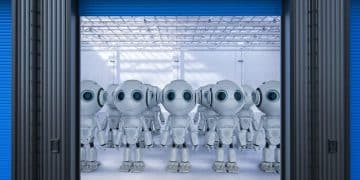The Ethics of Automation: Challenges and Opportunities in the US

The Ethics of Automation in the US involves navigating the complex interplay between technological advancements, job displacement, economic inequality, and societal values to ensure fair and equitable implementation.
The rise of automation in the United States presents a landscape of both immense promise and potential peril. Understanding the ethics of automation: navigating the challenges and opportunities in the US is crucial to ensure a future where technology benefits all members of society.
Understanding the Automation Landscape in the US
Automation, the process of replacing human labor with machines and software, is rapidly transforming industries across the United States. From manufacturing and logistics to healthcare and finance, automation technologies are impacting the way we live and work. Understanding this landscape is essential to navigating the ethical considerations that arise.
The Current State of Automation
The US has seen a significant increase in automation adoption in recent years. This is driven by factors such as the desire for increased efficiency, reduced costs, and improved productivity. However, the pace and scale of automation raise important questions about its impact on the workforce.
Key Industries Affected by Automation
Several industries are at the forefront of automation adoption. These include:
- Manufacturing: Robots and automated systems are used to perform repetitive tasks, increasing production speed and reducing errors.
- Logistics: Automated warehouses and delivery systems are streamlining supply chains and reducing labor costs.
- Healthcare: Automation is being used in areas such as diagnostics, surgery, and patient care.
- Finance: AI-powered tools are automating tasks such as fraud detection, risk assessment, and customer service.
The widespread adoption of automation technologies necessitates a thorough examination of their ethical implications.
The Ethical Challenges Posed by Automation
The increasing prevalence of automation in the US raises several ethical challenges that must be addressed to ensure a just and equitable transition. These challenges span job displacement, bias in algorithms, and the potential for increased economic inequality.

Job Displacement and Economic Inequality
One of the most pressing concerns surrounding automation is the potential for widespread job displacement. As machines become capable of performing tasks previously done by humans, many workers face the risk of losing their jobs. This can exacerbate economic inequality and create social unrest.
Bias and Discrimination in Automated Systems
Automated systems are often trained on large datasets, which can reflect existing biases in society. This can lead to biased outcomes, perpetuating discrimination against certain groups. Ensuring fairness and equity in automated systems is a critical ethical challenge.
Data Privacy and Security Concerns
Automation often involves the collection and analysis of vast amounts of data. This raises concerns about data privacy and security. Protecting sensitive information and preventing misuse of data are essential ethical considerations.
Addressing these ethical challenges requires careful consideration of the potential consequences of automation and proactive measures to mitigate negative impacts.
The Economic Opportunities of Automation
Beyond the ethical challenges, automation also presents significant economic opportunities for the US. These opportunities include increased productivity, economic growth, and the creation of new jobs in emerging fields.
Boosting Productivity and Economic Growth
Automation can significantly boost productivity by enabling businesses to produce more goods and services with fewer resources. This can lead to increased economic growth and improved living standards.
Creating New Jobs and Industries
While automation may displace some jobs, it can also create new jobs in areas such as robotics, AI, and data science. Investing in education and training programs to prepare workers for these new roles is crucial.
Enhancing Innovation and Competitiveness
Automation can foster innovation by enabling businesses to develop new products and services more quickly and efficiently. This can enhance the competitiveness of the US economy in the global marketplace.
Realizing these economic opportunities requires a strategic approach that balances the benefits of automation with the need to address its potential negative consequences.
Navigating the Ethical Landscape: Policy and Regulation
To ensure that automation benefits all members of society, it is essential to establish appropriate policies and regulations. These policies should address issues such as job displacement, bias, and data privacy.

The Role of Government in Regulating Automation
Government has a critical role to play in regulating automation. This includes setting standards for safety, privacy, and fairness. It also involves providing support for workers who are displaced by automation.
Developing Ethical Guidelines for AI and Automation
Several organizations are working to develop ethical guidelines for AI and automation. These guidelines aim to promote responsible development and deployment of these technologies. Key principles include:
- Transparency: Automated systems should be transparent and explainable.
- Accountability: Individuals and organizations should be held accountable for the decisions made by automated systems.
- Fairness: Automated systems should be fair and equitable, avoiding bias and discrimination.
The Importance of Education and Training
To prepare workers for the changing job market, it is essential to invest in education and training programs. These programs should focus on developing skills that are in demand in the age of automation, such as computer science, data analysis, and critical thinking.
Effective policies and regulations are essential for navigating the ethical landscape of automation and ensuring that its benefits are shared widely.
The Role of Corporate Social Responsibility
In addition to government regulation, corporate social responsibility (CSR) plays a vital role in ensuring the ethical use of automation. Companies have a responsibility to consider the social and economic impacts of their automation strategies.
Implementing Ethical AI Principles in Business
Businesses can implement ethical AI principles by:
- Conducting thorough risk assessments to identify potential biases and unintended consequences.
- Ensuring that automated systems are transparent and explainable.
- Involving diverse stakeholders in the design and development process.
Investing in Workforce Development and Retraining
Companies can mitigate the negative impacts of job displacement by investing in workforce development and retraining programs. These programs can help workers acquire new skills and find new jobs in emerging fields.
Supporting Community Initiatives
Businesses can support community initiatives that address the social and economic challenges created by automation. This can include funding for job training programs, support for small businesses, and investments in education.
By embracing corporate social responsibility, businesses can help ensure that automation benefits society as a whole.
The Future of Work in an Automated World
The future of work in the US will be shaped by the ongoing automation revolution. To thrive in this new environment, workers need to adapt and acquire new skills. The key is to foster a culture of lifelong learning and adaptability.
The Importance of Lifelong Learning
In an automated world, lifelong learning is essential. Workers need to be able to adapt to changing job requirements and acquire new skills throughout their careers. This requires access to affordable and high-quality education and training opportunities.
Developing Essential Skills for the Future
Some essential skills for the future include:
- Critical thinking: The ability to analyze information and solve problems.
- Creativity: The ability to generate new ideas and solutions.
- Collaboration: The ability to work effectively with others.
- Technical skills: Proficiency in areas such as computer science, data analysis, and AI.
Embracing a Human-Centered Approach to Automation
As automation transforms the workplace, it is important to embrace a human-centered approach. This means focusing on how technology can augment human capabilities and improve the lives of workers. It also means ensuring that workers have a voice in the design and implementation of automated systems.
By embracing a forward-thinking approach, the US can harness the power of automation to create a more prosperous and equitable future for all.
Understanding the Future of Work in an Automated World is important. Therefore we need strategies to foster adaptility and life long learning.
| Key Point | Brief Description |
|---|---|
| 🤖 Job Displacement | Automation can lead to job losses across various sectors. |
| ⚖️ Ethical AI | Ensuring fairness and transparency in automated systems is crucial. |
| 💼 Corporate Responsibility | Businesses should address automation’s social and economic impacts. |
| 📚 Lifelong Learning | Continuous education is essential for adapting to new job roles. |
FAQ
▼
The main ethical concerns include job displacement, bias in algorithms leading to discrimination, and data privacy issues due to increased data collection and analysis.
▼
Businesses can ensure ethical AI implementation by conducting risk assessments, ensuring transparency in automated systems, and involving diverse stakeholders in their development.
▼
The government plays a crucial role by setting standards for safety, privacy, and fairness. It also provides support for workers displaced by automation through retraining programs.
▼
Lifelong learning is essential because workers need to adapt to changing job requirements and acquire new skills throughout their careers, ensuring continued employability.
▼
Critical thinking, creativity, collaboration, and technical proficiency in areas such as computer science and data analysis are highly valuable in the age of automation.
Conclusion
As automation continues to reshape the US economy and society, understanding and addressing its ethical implications is paramount. By implementing robust policies, encouraging corporate social responsibility, and investing in education and training, the US can navigate the challenges and harness the opportunities of automation to create a more prosperous and equitable future for all.





